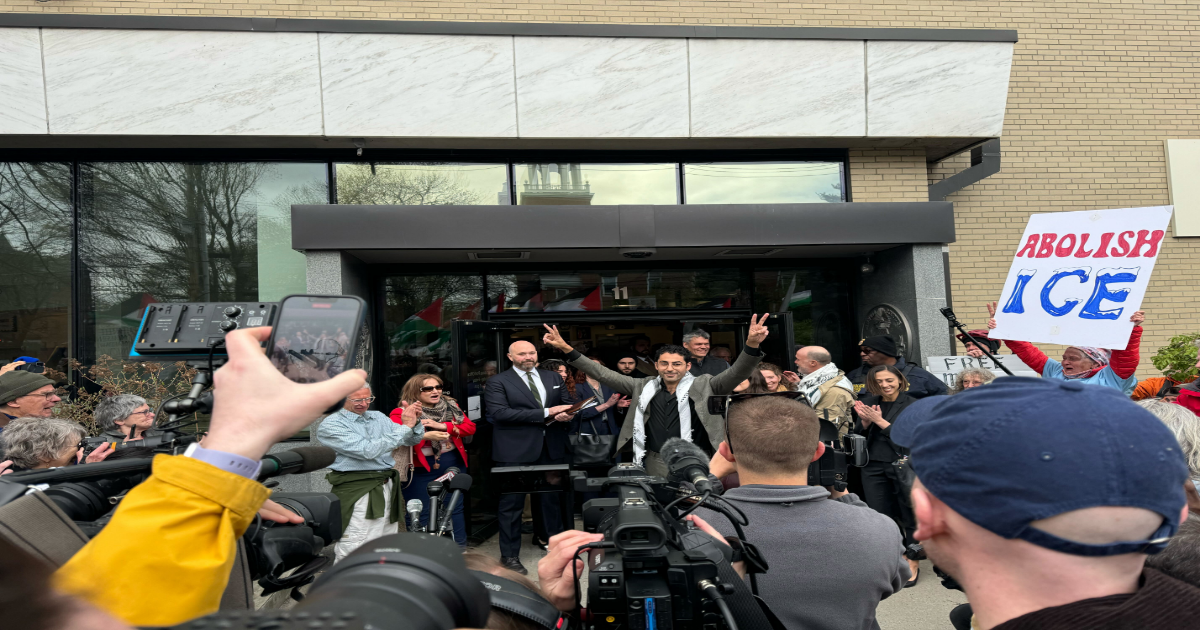BURLINGTON, Vermont — A federal judge on Wednesday ordered the immediate release of a Columbia University student who was detained by immigration authorities and targeted for deportation over his involvement in pro-Palestinian protests.
Mohsen Mahdawi was arrested as part of a crackdown on foreign students who were legally studying in the United States. Secretary of State Marco Rubio has invoked a rarely used provision of immigration law to target some of the students for deportation by declaring that their continued presence in the country harms America’s foreign policy interests.
Mahdawi was detained April 14 when he showed up to an immigration office in Vermont for a naturalization interview.
“I am saying it clear and loud,” Mahdawi said outside a federal courthouse shortly after U.S. District Judge Geoffrey Crawford , an Obama appointee, ordered his release. “To President Trump and his Cabinet: I am not afraid of you.”
Crawford’s order does not end the Trump administration’s effort to deport Mahdawi; it simply allows him to remain free while his case proceeds. Another federal judge, Clinton appointee William Sessions III, had previously blocked immigration authorities from transferring Mahdawi to a detention facility in a more conservative judicial district — a strategy the Trump administration has used with other detainees.
Mahdawi is Palestinian and grew up in the West Bank but has lived in the U.S. for a decade. He has a green card, making him a legal permanent resident, and was in the final stages of the process to become a U.S. citizen when immigration authorities arrested him.
Like other pro-Palestinian students and professors who have been arrested and thrust into swift deportation proceedings in President Donald Trump’s first 100 days, Mahdawi has argued that the administration is violating the First Amendment by targeting him for criticizing Israel and participating in campus protests.
Another leader of Columbia’s pro-Palestinian protest movement, Mahmoud Khalil, has been fighting the Trump administration’s efforts to deport him for nearly two months. Khalil, who like Mahdawi has a green card, is currently detained in Louisiana.
Other academics whom the Trump administration is seeking to quickly deport include Badar Khan Suri, a Georgetown University researcher who was detained in part over his father-in-law’s role as a former adviser to Hamas, and Rumeysa Ozturk, a Tufts University student who has written critically about Israel.
All of them have been deemed by Rubio to be adverse to U.S. foreign policy interests. Courts have been increasingly skeptical of the deportation effort, with one Reagan-appointed judge ruling Tuesday that a broad First Amendment challenge to the effort can move forward.
But Mahdawi is believed to be the first student ordered released from detention after being targeted by Rubio’s foreign-policy determination.
The departments of State and Homeland Security did not immediately respond to requests for comment. The administration quickly signaled its intent to appeal Crawford’s ruling to the Massachusetts-based 1st Circuit Court of Appeals.
Crawford said at a court hearing Wednesday that Mahdawi, a resident of the Upper Valley region in Vermont, had experienced “great harm” by being detained for two weeks.
“Even another day of detention is not to be tolerated,” the judge said.
Crawford compared the Trump administration’s targeting of college students over their speech to the McCarthyism of the 1950s, when academics were persecuted for suspected Communist sympathies.
“The wheel has come around again,” the judge said.
Crawford determined that Mahdawi did not pose a public safety or flight risk, and under the conditions of his release, he is permitted to continue to attend classes at Columbia in New York. Mahdawi is set to graduate in May and plans to pursue a graduate degree in the fall.
The judge indicated he would issue a written order spelling out more details about the conditions of Mahdawi’s release.
Mahdawi walked out of the courtroom minutes after the judge announced his decision from the bench to a raucous crowd of several hundred supporters, whom he led in several anti-war chants. Mahdawi said that when he was arrested earlier this month, he was immediately driven to the airport to be sent to an out-of-state holding facility — but missed the flight by nine minutes.
“Me standing here in front of you sends a clear message: We the people will hold the Constitution accountable for the principles that we believe in,” Mahdawi said.
Crampton reported from Burlington, Vermont. Cheney reported from Washington.
CORRECTION: A previous version of this report misidentified the judge who presided over Wednesday’s hearing and ordered Mahdawi’s release.
